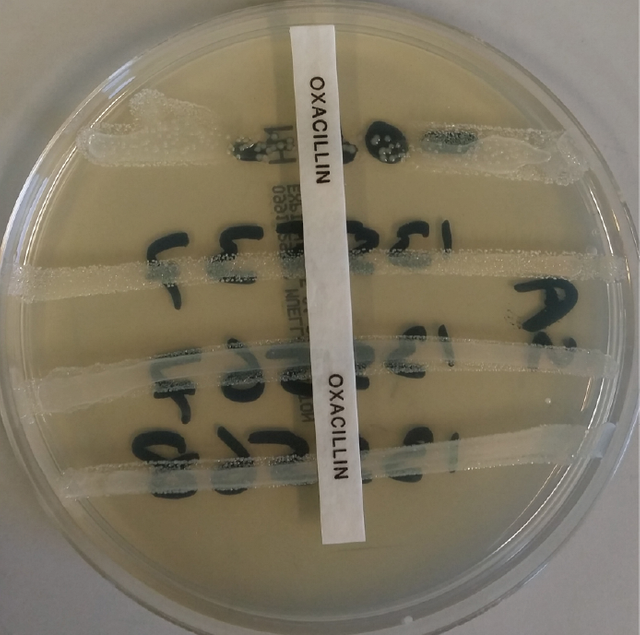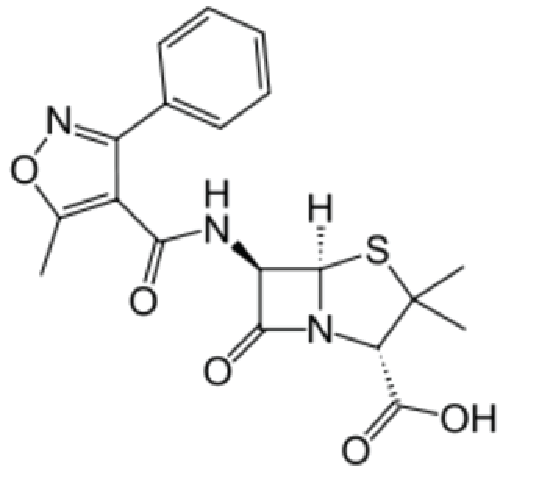The Future Treatment Against Antibiotic Resistant Superbugs May Be Inside of YOU Right Now

The thumbnail image above is of an agar bacteria plate, and the light colored streaks you see upon it are a bunch of bacterial colonies (millions and millions of bacteria). This particular agar plate has been treated with oxacillin:

The bacteria that is growing on that plate is Staphylococcus aureus (aka Staph, the causative bacteria that results in a “staph infection.”) S. aureus are un-treatable by standard penicillin derived antibiotics because they have an enzyme called penicillinase which breaks these compounds down. Oxacillin and the similar Methicillin were historically used instead to kill S. aureus. However, you have likely already noticed that the S. aureus growing on that plate above don’t seem to mind the presence of the Oxacillin antibiotic. You are also likely very familiar with the name given to this sort of S. aureus, it’s called MRSA (which stands for Methicillin Resistant Staphylococcus Aureus). This and other bacteria like it pose an issue for our health and the health of our loved ones because without being able to use Oxacillin (or other antibiotics similar to it) we really don’t have many other highly effective ways to treat the infection.
Why Are We Running Out of Antibiotic Options?
Money. The large pharmaceuticals are profit driven businesses, they just don’t get a large return out of focusing on antibiotic research. After all you can only be administered these drugs for a short period of time until they beat back the infection and you no longer need them! Pharma prefers boner pills, opioid pain meds, or anti HIV treatments, you know chronic issues that necessitate taking a medication to deal with them indefinitely (they gotta drain you of your money after all). An unfortunate side effect of this profit driven business model is that areas that lack that financial incentive seem to get largely ignored. One of those areas is and has been the search for new antibiotics.
On The Bright Side We Aren’t Only Dependent on Pharma For New Antibiotics
There are still a variety of academic researchers who are focusing on these sorts of tasks as well. Recently some interesting potential compounds have come out of studying the organism’s that make up our microbiome. Before we talk about the new research, let’s discuss what the microbiome is to begin with, as it’s a flashy term that has been popping up even in mainstream news for a while now!
The Microbiome
When scientists talk about the human microbiome, what they are really talking about is the collection of all of the genomes from all microbial organisms which reside both on and inside the human body. Just how many bacteria are in the human body? Well, as little as 10 years ago scientists believed that our bodies contained as many as 10 bacterial cells for every human cell (and our bodies contain on average 30 trillion human cells), however this has recently been shown to be a myth and the number has been re-estimated to about 1 bacterial cell for every human cell (I guess that means we are all only half human…a significant upgrade from before when we were thought to be only 9.1% human) (3). What you should take from this information is that there are a TON of bacterial cells in and on the human body, and there is actually a surprising variety of different organisms all living symbiotically (together in harmony):

Since there are so many different microorganisms present, the number of different genomes is also massive! This means there are potentially many biological “treasures” to be found from studying it.
Humimycins
One of the first treasures to have come out of all of the data generated by human microbiome analysis comes from an article recently published in Nature Chemical Biology where the authors describe the identification and synthesis of a new class of antibiotics called humimycins. This antibiotic functions by inhibiting an enzyme called a lipid II flipase. Flipases are enzymes which are involved in the shuttling of lipids (fatty acid molecules) and are responsible for maintaining the composition of the cellular phospholipid bylayer. By inhibiting this enzyme class, humimycins are able to stop S. aureus from proper maintenance of its cell membrane, and lead to its death. This is a totally separate mechanism from how the Oxacillin like molecules function (they also work by messing with a part of the bacterial cell membrane, but through a different mechanism). Humimycins are also not susceptible to degradation through the pathway which allows MRSA to resist the Oxacillin antibiotics (cleavage of the antibiotics β-lactam ring by the bacterial β-lactamase enzyme), so this new antibiotic could prove very useful in the treatment of these and other antibiotic resistant bacterial strains.
Hope For The Future
Results like these give me hope (I hope they do the same for you) for the identification of more beneficial compounds. Who knows, maybe the next great antibiotic, allergy medication, or even obesity treatment could be found in some of the bacteria living in your body. We are host to so many different organisms and we need them for a healthy life as much as they need us. Going forward maybe we will find that to identify some of the most effective treatments we just needed to look within ourselves. Call it, cellular introspection if you will.
Referenced Materials
- https://en.wikipedia.org/wiki/Oxacillin
- https://en.wikipedia.org/wiki/Human_microbiota
- http://www.nature.com/news/scientists-bust-myth-that-our-bodies-have-more-bacteria-than-human-cells-1.19136
- http://news.nationalgeographic.com/2016/01/160111-microbiome-estimate-count-ratio-human-health-science/
- http://www.nature.com/nchembio/journal/vaop/ncurrent/full/nchembio.2207.html
If you like my work, please consider giving me a follow: @justtryme90. I am a PhD holding biochemist with a love for science. My future science blog posts will cover a range of topics in the biology/chemistry fields.
Thank you for your support of my work!
This is very informative for those of us who hear tidbits on the news, but don't really put it all together. I love the "Money" response up there. It's sad that the research is so driven by the market when such a need remains. I wonder to what extent foundations are getting involved in this.
Good job @justtryme90! Very interesting
Thank you :)
I think we can also add, to the money-pharma issue, that the fact that there is no competition for such a research field is unhealthy. As soon as there will be several groups on the market getting interested in these new techniques, the money will probably get materalized.
Go science! This is a big issue, hopefully we'll be able to beat it
It's in the cross hairs of some very brilliant researchers, I have heard about a few interesting projects people are working on pertaining to antibiotic resistance, so I think progress is being made quick enough that we will avoid a severe disaster.
As gross as it sounds but have you heard of Fecal Microbiota Transplants (FMT)? This uses microbiomes from healthy donors and transplant them to treat resistant bacteria. There has been a lot of success in the treatment of antibiotic resistance C. Diff. Good post. The microbiome is so interesting, you just gained a follower!
I have indeed heard about FMT. It is one of the only ways to treat C difficil infection actually. There are also some clinical trials going on with regards to its use in treating a variety of other intestinal diseases IIRC.
We have known about the human microbiome for quite a long time, but its really only in the past few years that we have begun to understand just how involved it is to our overall well being. There is a surprising amount of communication (chemically) that occurs between our gut bacteria and our own body. It's a fascinating field of study and one of the areas that I think we are going to be seeing a lot more from in the next couple of decades.
I love learning more and more about the mircobiome. It is really crazy Ed Yong is an so knowledgeable in the field. In this talk, he brings up how interconnected we are with all these microorganisms.
I believe this is going to be the more powerful way to treat disease in the future.
Included in Steemprentice Spotlight :)
Tweeted by SteemLand
This post has been linked to from another place on Steem.
This post has also been linked to from Reddit.
Learn more about and upvote to support linkback bot v0.5. Flag this comment if you don't want the bot to continue posting linkbacks for your posts.
Built by @ontofractal
Great article. Meropenem seems to be the big drug used for many resistant bacteria right now...however, it is scary when options get fewer by the day!